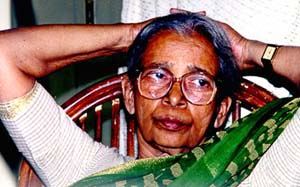'People like Mahaswetadi can never die. They live in our hearts and minds.'

Mahashweta Devi, who passed into the ages on Thursday, July 28, was a mother, friend and Didi to so many people.
Writer Nabaneeta Dev Sen, a winner of the Sahitya Akademi Award, was very close to Mahashwetadi.
It's too difficult to write a tribute to Mahaswetadi. I was way too close to her.
Her father Manish Ghatak, a well-known poet and novelist of the Kallol movement, (who used the pseudonym Jubanashwa) was very close to my father Narendra Dev, who too was deeply involved with the same movement.
We had a lot in common.
We shared a birthday and a nickname, khuku.
Mahaswetadi had 10 siblings and was deeply involved in household chores from an early age.
She was a mother figure to her younger siblings and took very good care of them. I was my parents' only child and led a rather protective life in this city (Kolkata).
Mahaswetadi was always there for me when I needed her. The day my father died, she sat beside my father's body and sang a number of Rabindranath Tagore's songs.
Having spent her formative years in Santiniketan, Didi had a melodious voice that was devoid of the typical urban grooming. It was a voice that had an infectious overtone. Her powerful rendition reached one's soul.
As she continued to sing, Ma, silenced by her grief, listened to her. That scene is still etched in my mind.
After my mother died, I had made elaborate arrangements for her shraddh and there were about 800 invitees. Mahaswetadi was with me throughout.
"You are jethima's perfect daughter. There couldn't have been a fitting tribute to her," she said while hugging me tight.
There is no point in discussing her literary skills. The whole world knows about them.
What always fascinated me is her passion for the topics that she wrote about.
She wrote what she believed in and penned her conviction with such vigour and eloquence that her novels and short pieces became powerful statements that shook the root of all conventional thoughts.
All her life, Mahaswetadi fought for the cause of the tribals and the downtrodden. She was their Ma, their comrade, their saviour -- rolled into one.
She would often visit the tribal villages and spend days with them in their houses. Hers was a life bereft of any pretention.
If she was fighting for a cause, she needed to take the plunge head on. There were no two ways about it.
During her stay in a modest apartment in south Kolkata, I saw many tribal people visiting her. She would play the perfect hostess. She would not only share her rooms with them but would also cook and have lunch together.
Her fight for tribal causes got reflected in her novels and short stories. They were no mere literary works, but hard-hitting statements that spoke for the marginalised people.
When she got the Jnanpith Award in 1996, I was the first to break the news to her over the telephone from New Delhi.
I was a member of the Jnanpith Award selection committee.
"O, accha, tui thik janish??(Is it so, are you sure?)," was her only reaction.
She was nominated for the award on an earlier occasion too, but some people then denied her the honour on the ground that her works were 'anthropological' by nature.
I met her last in 2014. She had sung quite a few Tagore songs on that day too.
I could not visit her after 2014 because of my ill health and work pressure, but we kept in touch over the telephone.
Distance could not mar our love for each other.
I knew she would always be there for me. However, today, she has travelled way too far. There is a queer lump in the throat.
As I get old in years, the world around me gets emptier. But then I know for sure people like Mahaswetadi can never die. They live in our hearts and minds. Souls like her become a part of our existence.
They define eternity.










